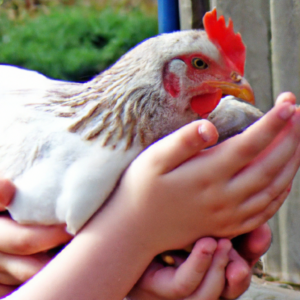
You wake up excitedly to collect eggs from your backyard flock, only to find cracked shells and sticky messes. Egg-eating has become a frustrating problem, leaving you wondering what the best strategy is to prevent it in your flock. In this article, we will explore effective methods to tackle this issue and ensure your hens become expert egg layers, rather than egg thieves.

Understanding Egg-Eating Behavior
What is egg-eating behavior?
Egg-eating behavior refers to the act of chickens consuming their own eggs. This behavior can be concerning for poultry owners as it not only leads to a loss of potential eggs but can also encourage other hens to develop the same habit. Understanding the reasons behind egg-eating behavior is crucial in order to effectively address and prevent it.
Why do chickens eat their own eggs?
Chickens may engage in egg-eating behavior due to various reasons. One common cause is a lack of sufficient calcium in their diet. Calcium is essential for the formation of strong eggshells, and when chickens do not receive enough calcium, they may attempt to consume their own eggs in order to obtain this vital nutrient. Boredom and stress can also contribute to egg-eating, as these factors may lead chickens to seek out novel and interesting behaviors. In some cases, there may also be a genetic predisposition for egg-eating behavior in certain breeds of chickens.
Identifying Signs of Egg-Eating
Empty eggshells
One of the most obvious signs of egg-eating behavior is finding empty eggshells in the nesting boxes or coop. If you consistently notice eggshells with no intact egg inside, it is likely that your chickens are consuming their own eggs.
Yolk or egg white residue
Another telltale sign of egg-eating is the presence of yolk or egg white residue on other eggs or around the nesting area. If you notice sticky or slimy substance on eggs that are still intact, this may indicate that the chickens have been pecking and consuming the contents.
Messy nests
Chickens that engage in egg-eating behavior may also create messy nests. This is often due to their attempts to break open and consume the eggs. If you find nests with egg residue or scattered broken shells, it is a clear indication of egg-eating.
Feathers or feed stuck to eggs
Eggshells that have feathers or feed stuck to them can also be a sign of egg-eating. Chickens may inadvertently leave traces of feathers or feed behind while pecking and consuming the eggs. Keep an eye out for these signs when inspecting your nesting boxes or collecting eggs.

Determining the Root Cause
Inadequate nest boxes
One possible cause of egg-eating behavior is the lack of appropriate nest boxes. Insufficient nest boxes or poorly designed ones may lead to eggs being easily broken and accessible to the chickens. Ensuring that you provide enough nest boxes that are appropriately sized and designed can help prevent egg-eating behavior.
Insufficient calcium
A lack of calcium in the chickens’ diet can contribute to their propensity to eat their own eggs. To prevent this, it is essential to provide calcium-rich feed options and consider the supplementation of oyster shells or other calcium sources. Ensuring that your chickens receive a balanced diet with adequate calcium levels can deter egg-eating behavior.
Boredom and stress
Boredom and stress can drive chickens to engage in destructive behaviors such as egg-eating. To address this issue, it is important to provide ample space and environmental enrichment for your flock. Allowing natural foraging behavior, providing social interaction with a diverse flock, and minimizing disruptions and disturbances can help alleviate boredom and reduce stress levels in your chickens.
Genetic predisposition
In some cases, egg-eating behavior may be linked to genetic predisposition. Certain breeds of chickens may have a higher likelihood of developing this behavior. If you notice a consistent pattern of egg-eating within a specific breed, considering alternative breeds or consulting with experienced breeders can help address this issue.
Creating Optimal Nesting Conditions
Providing enough nest boxes
To prevent egg-eating behavior, it is important to ensure that you provide enough nest boxes for your flock. A general guideline is to have one nest box per four to five hens. This ensures that each chicken has a designated space to lay their eggs, reducing the chances of eggs being broken and subsequently consumed.
Ensuring comfort and cleanliness
Creating a comfortable and clean nesting environment is essential in preventing egg-eating behavior. Regularly clean the nesting boxes, removing any soiled bedding or broken eggs. This helps maintain hygiene and prevents chickens from being tempted to consume their own eggs due to dirty or unsanitary conditions.
Sufficient bedding material
Adequate bedding material in the nest boxes provides cushioning and helps protect the eggs from accidentally breaking. Consider using materials such as straw, wood shavings, or grass clippings to provide a soft and supportive bedding surface. Avoid using materials that may stick to the eggs, as this can further encourage egg-eating behavior.
Appropriate nest box placement
Proper nest box placement is important to prevent egg-eating and promote nesting behavior. Ideally, nest boxes should be located in a quiet and secluded area of the coop, away from high-traffic areas. This helps create a sense of privacy for the hens and reduces the likelihood of eggs being disturbed or broken.

Promoting a Balanced Diet
Calcium-rich feed options
To prevent egg-eating behavior caused by calcium deficiency, it is crucial to provide your chickens with a balanced diet that includes calcium-rich feed options. High-quality layer pellets or crumbles specifically formulated for laying hens often contain added calcium. Ensure that the feed you provide meets the nutritional needs of your flock.
Supplementation with oyster shells
Supplementing your chickens’ diet with oyster shells is an effective method to ensure they receive adequate calcium. Oyster shells are an excellent source of calcium and can be offered as a separate feed or mixed with their regular feed. Place a separate container with oyster shells in the coop and allow the chickens to consume them freely.
Monitoring nutritional needs
Regularly monitor the nutritional needs of your flock to prevent any deficiencies that may contribute to egg-eating behavior. Consult with a poultry veterinarian or avian nutritionist to determine if any adjustments need to be made to your chickens’ diet based on their age, breed, and production status.
Feeding strategies to avoid waste
Proper feeding strategies can help reduce waste and discourage egg-eating behavior. Avoid overfilling the feeders, as excess feed can be trampled or soiled, potentially attracting chickens to peck at it instead of their eggs. Additionally, consider using feeders designed to minimize spillage or waste, such as treadle feeders or specially designed hoppers.
Reducing Boredom and Stress
Ample space and environmental enrichment
Providing adequate space for your flock is crucial in preventing boredom and reducing stress levels. Ensure that your chickens have enough room to move around, stretch their wings, and engage in natural behaviors. If possible, give them access to a secure outdoor area where they can forage and explore, which can greatly reduce their inclination to engage in destructive behaviors like egg-eating.
Allowing natural foraging behavior
Allowing your chickens to engage in natural foraging behavior can be a great way to keep them mentally stimulated and prevent boredom. Scatter scratch grains or treats in their living area or use specially designed foraging toys to encourage natural behaviors and prevent them from seeking out their own eggs.
Social interaction with a diverse flock
Chickens are social creatures and thrive in the presence of other chickens. Ensure that your flock has the opportunity to interact with a diverse group of hens. This not only provides mental stimulation but also helps establish a hierarchy and reduce stress. The presence of a rooster can also help maintain flock dynamics and reduce boredom.
Minimizing disruptions and disturbances
Chickens can be easily stressed by loud noises, sudden disturbances, or frequent handling. Minimize disruptions in their environment and avoid unnecessary disturbances. This helps create a calm and stable environment for your chickens, reducing the likelihood of egg-eating behavior caused by stress.
Addressing Genetic Predisposition
Selective breeding for non-egg eaters
If you are breeding chickens, consider selectively breeding for non-egg eaters. Observation and identification of individuals with low or no inclination to consume eggs can help reduce the incidence of egg-eating behavior in future generations. Over time, this selective breeding process can contribute to a decreased genetic predisposition for egg-eating in your flock.
Consulting with experienced breeders
Experienced breeders can be a valuable source of information and guidance when addressing genetic predisposition for egg-eating behavior. Seek advice from those who have successfully bred chickens with reduced or no egg-eating tendencies. By tapping into their wealth of knowledge, you can gain essential insights and strategies for managing and minimizing egg-eating in your flock.
Identifying characteristics associated with egg-eating
Observing and identifying certain characteristics associated with egg-eating behavior can help you make informed decisions about your breeding program. Pay close attention to individuals that display a strong inclination to consume eggs and consider excluding them from your breeding stock. By being proactive in identifying and addressing these traits, you can make progress in breeding chickens with reduced egg-eating behavior.
Considering alternative breeds
In some cases, addressing genetic predisposition for egg-eating may require considering alternative breeds. Certain breeds have been found to have a lower likelihood of developing this behavior. Research and consult with experienced poultry breeders to select breeds that are less prone to egg-eating. By introducing these breeds into your flock, you can decrease the overall occurrence of egg-eating behavior.
Utilizing Deterrent Techniques
Fake eggs or golf balls
Placing fake eggs or golf balls in the nesting boxes can serve as a deterrent for egg-eating behavior. Chickens may peck at these objects, and the hardness and lack of content will discourage further attempts to consume eggs. Replace the fake eggs or golf balls with real eggs once the hens have stopped showing interest in pecking them.
Placing wire baskets over nests
Placing wire baskets over the nests can make it difficult for hens to access the eggs. The wire mesh allows the eggs to roll into a safe area while preventing the chickens from reaching and pecking at them. Ensure that the wire mesh has a small enough gauge to prevent the hens from sticking their beaks through and reaching the eggs.
Using curtain or trap boxes
Curtain or trap boxes can be effective in preventing egg-eating behavior. These boxes have an opening that allows the chicken to enter and lay their eggs, but once they attempt to peck at the eggs from the outside, a curtain or trap mechanism is triggered, preventing access to the eggs. This teaches the chickens that their attempts to eat the eggs result in frustration and deters further egg-eating behavior.
Applying bitter substances to eggs
Another deterrent technique is applying bitter substances to eggs. These substances, such as vinegar or commercial egg-eating deterrents, create an unpleasant taste when chickens attempt to consume them. While this method can be effective, it is important to ensure that the bitter substances used are safe for consumption by the chickens and do not adversely affect the eggs’ quality.
Regular Monitoring and Intervention
Checking nests frequently
Regularly checking the nests for any signs of egg-eating is crucial in addressing and preventing this behavior. Make it a habit to inspect the nesting boxes daily to promptly identify any broken or missing eggs. This allows for immediate intervention and implementation of appropriate strategies to discourage egg-eating behavior.
Collecting eggs promptly
Promptly collecting eggs from the nesting boxes minimizes the opportunity for chickens to engage in egg-eating. Remove eggs as soon as they are laid to prevent them from becoming tempting targets for the chickens. Regular egg collection also helps maintain the overall cleanliness of the nesting area and reduces the chances of broken eggs and subsequent egg-eating.
Inspecting flock behavior
Regularly observing and monitoring the behavior of your flock can provide valuable insights into potential egg-eating issues. Pay attention to how the chickens interact with one another and their nesting area. Look for any signs of boredom, stress, or aggression that may contribute to egg-eating behavior. Identifying and addressing these behavioral cues early on can help prevent the habit from developing further.
Taking immediate action upon detection
If you detect any signs of egg-eating behavior, it is essential to take immediate action. Implement the appropriate deterrent techniques and adjustments to nesting conditions and diet as discussed earlier in this article. Swift intervention helps break the habit and reduces the chances of other chickens learning the behavior from the culprit.
Seeking Professional Advice
Consulting with a poultry veterinarian
If egg-eating behavior persists despite your efforts, consulting with a poultry veterinarian is recommended. A veterinarian can conduct a thorough examination of your flock, identify any underlying health issues that may contribute to the behavior, and provide targeted advice and solutions to address the problem.
Engaging with local agricultural extension services
Local agricultural extension services can be a valuable resource for poultry owners dealing with egg-eating behavior. These services often provide expert guidance, workshops, and educational materials related to poultry management and health. Engaging with these services can help you gain additional knowledge and assistance in managing and preventing egg-eating.
Joining online poultry communities
Joining online poultry communities and forums provides an opportunity to connect with experienced poultry owners and enthusiasts. These communities often offer a wealth of shared experiences, advice, and strategies for addressing egg-eating behavior. Participating in these online communities allows you to learn from the experiences of others and gain insights into effective solutions.
Attending workshops or seminars
Attending workshops or seminars focused on poultry management and behavior can enhance your understanding of egg-eating and provide practical strategies for prevention. These events often feature renowned experts in the field who share their knowledge and insights. Networking with fellow attendees and experts can also provide valuable support and advice specific to your region or circumstances.
In conclusion, understanding egg-eating behavior in chickens is the first step towards effectively addressing and preventing it. By identifying the signs of egg-eating, determining the root causes, and implementing appropriate strategies such as creating optimal nesting conditions, promoting a balanced diet, reducing boredom and stress, addressing genetic predisposition, utilizing deterrent techniques, regularly monitoring and intervening, and seeking professional advice when necessary, you can successfully mitigate and manage egg-eating behavior in your flock.







